20 profit-making small businesses you can start with as low as Rs 20,000
List of 20 Profitable Manufacturing Business Ideas You Can Start With Little Investment. Handmade candles andles are always in demand, which makes it a very p
- by B2B Desk 2021-01-14 06:14:00
Starting a business isn't just about ideas. It's about making ideas come true. But ambitious founders often find themselves struggling, with investments and ideas, before joining the hustle.
You may have many ideas in mind, but there are times when these ideas lack direction and you decide to change your plan. This is a period when most aspiring founders struggle to find a balance.
Starting a business requires the utmost determination and confidence, but you must be very clear about your business idea before entering the field of entrepreneurship.
List of 20 Profitable Manufacturing Business Ideas You Can Start With Little Investment.
Handmade candles
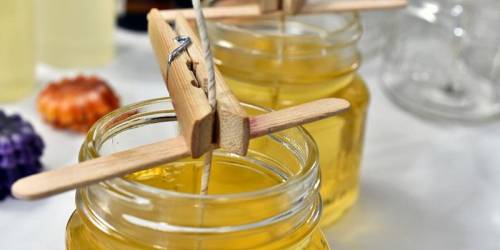 andles are always in demand, which makes it a very popular trading option. The traditional demand for candles comes from religious and decorative purposes. During festivals, the demand is very high. Apart from that, too, these days, the demand for aromatic and medicinal candles is also increasing as many restaurants, families and hotels use them to create atmosphere.
andles are always in demand, which makes it a very popular trading option. The traditional demand for candles comes from religious and decorative purposes. During festivals, the demand is very high. Apart from that, too, these days, the demand for aromatic and medicinal candles is also increasing as many restaurants, families and hotels use them to create atmosphere.
The candle making business can be started from home with a low investment of around Rs 20,000 to Rs 30,000.
The raw materials used to start a business include wax, wicks, molds, ropes, essential oils, and more.
Besides the main raw materials, you also need some equipment to make candles. This includes a crucible, thermometer, melting pan, balance, hammer, and oven (for melting wax).
Pickles

Pickles are a traditional food in India and are very popular. You will find at least one type of pickle in every Indian home. Therefore, if you want to start a small business, making pickles is a safe and easy option.
Apart from the Indian market, Indian pickles are in great demand abroad.
You can start this business at home with a small capital of Rs 20,000 to Rs 25,000.
Incense sticks (agarbatti)
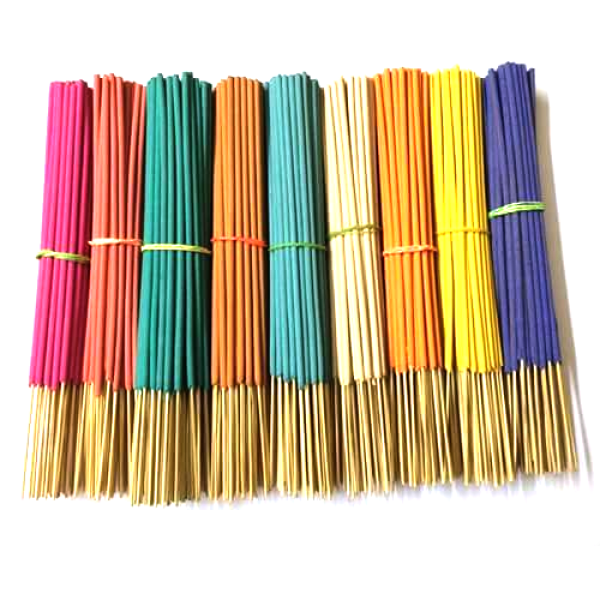
The market for Agharbatti (incense sticks) is growing in India due to the high demand at home and abroad.
Agarbattis is used in most Indian homes and its popularity and demand increases during the Christmas season. Its exports have also grown, in a context of the growing popularity of meditation in other countries and the associated use of agarbattis.
The first step in making agarbati on a small scale is buying bamboo sticks and fragrant essential oils like sandalwood, jasmine, rose, shampoo, etc. From the market. The bars are coated with oil and dried.
Automatic and semi-automatic agarbatti making machines, which cost up to Rs 50,000, can be used for mass production.
Once packaged and labeled, the sticks are ready to be sold at the local market.
Buttons
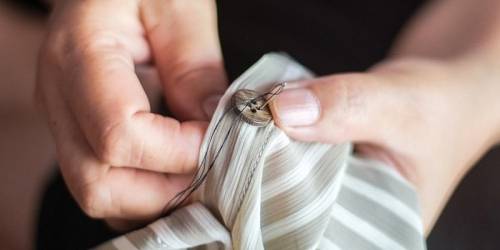
Buttons are one of the most important adornment tools used in the clothing industry and have enormous market potential.
From plastic to buttons made of fabric and steel, there are several categories in this niche that you can select based on your choice of work.
You can rent a space or start a house with a base investment of around Rs 30,000, Rs 40,000.
Designer lace
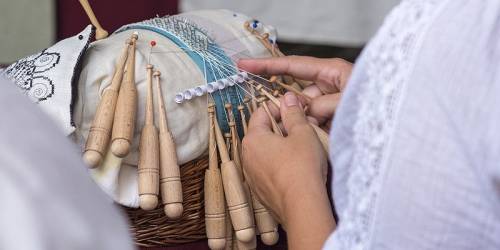
Lace is commonly used in clothing and for crafts. It is a traditional form of business and can be easily started at home.
With the emergence of fashion trends, the demand for various types of laces has increased. The laces are also exported to several countries, making it a good option for those who want to start small. The cords can be designed manually, using bobby machines or fully computerized machines, after you decide the scale of operations.
You can start this business with a low investment of 25,000 to 50,000 rupees.
Shoelaces

India is the second largest shoe producer after China. The shoes manufactured by the country can be separated into categories such as sports, formal and informal shoes, etc.
The demand for laces is also high and manufacturing laces has become a profitable idea for small businesses.
Shoelaces are made by weaving a ribbon and tying a ring (the reinforcing end of the lace). Usually the plain woven tape is made of cotton, polyester, nylon, polypropylene, etc., and the strap is made of plastic.
In addition to the material for the lace and the ring, shoelace braiding machines are also in demand. They can weave several meters of lace per minute, after which acetone can be used to attach the ring to the woven belt.
You can start this business with a small investment of approximately Rs 25,000, depending on the type of machine you want to implement.
Ice cream cones

Everyone is clamoring for ice cream, and it is one of the most popular desserts today. The increasing consumption of ice cream has increased the demand for ice cream.
So if you want to start small, this idea could be a profitable business option. You can start an ice cream cone making unit in a small space by investing approximately 1 lakh of rupees to 1.5 lakh of rupees.
However, if you want to operate on a larger scale with high-capacity machines, the investment cost increases a bit.
Homemade chocolates
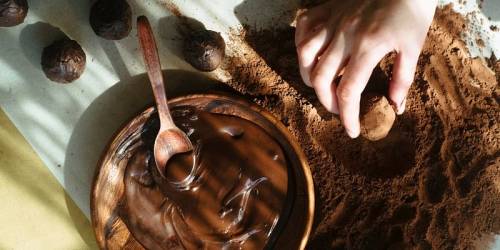
When it comes to consuming chocolate, India tops the list. Sweet or sour, chocolate improves mood and relieves stress. According to Mintel, sales of chocolate confectionery products in the retail market grew by 13 percent between 2015 and 2016 in India. So if you want to start your own business and have no idea, chocolate making can be a lucrative opportunity.
You need to develop a production line to start. A capital of approximately Rs 40,000 to Rs 50,000 would be required for the purchase of raw materials and packaging.
However, if you want to implement a piece of machinery on a larger production scale, the cost could increase to Rs 2 lakh-Rs 3 lakh. Volume production will be easier with mixing, cooking and cooling equipment. Select the type of equipment that best suits the size of your operation.
Cotton buds
The market for cotton buds is driven by higher per capita consumer spending, increased hygiene awareness, increased population, etc. Small manufacturers of cotton swabs should obtain the spindle / rod, absorbent material (cotton), and product packaging.
The raw materials then go into automatic cotton bud making machines, many of which also package the products. The machines are available according to the quality and production requirements of the entrepreneur. The cotton bud making business can be started with an investment of Rs 20,000-40,000.
Papad
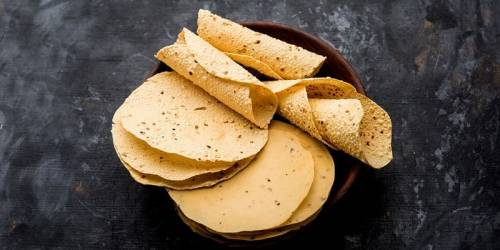
Thin and crunchy food, fried or roasted, is a popular accompaniment to most meals in India. Dads are a must for many occasions, functions, celebrations, and parties, which makes the demand always high. The manufacturing process is relatively simple once the basic ingredients like wheat flour, spices and oil are obtained.
The large-scale papad manufacturing industry is highly competitive, but entrepreneurs can start with a small investment of around Rs 30,000 Rs 40,000 and sell it in local shops.
Entrepreneurs can also try flour made with lentils, chickpeas, rice, tapioca, and more to differentiate their offerings from others.
Noodles
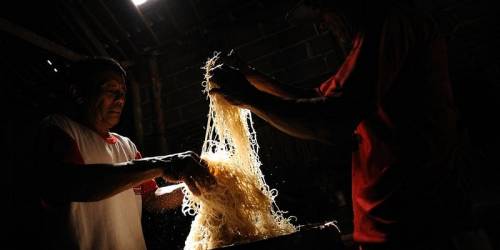
Noodles, especially the instant variety, are a popular Indian snack in both rural and urban markets. The pasta manufacturing process is simple and requires basic ingredients such as wheat flour, salt, sugar, starch, spices, vegetable oil, etc.
Both semi-automatic and fully automatic noodle making machines are commercially available. The pasta-making process involves mixing flour, starch, and baking soda, mixing the dough, and running it through the machine. Cut pasta to desired shape and size, pat dry and package.
Low capacity noodle-making machines cost more than Rs 40,000, while premium machines anywhere cost more than Rs 1.5 lakh.
Disposable plates and cups
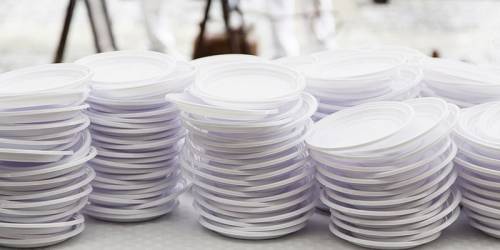
Disposable food plates and cups are widely used in India during events, work, outings, etc. They are also widely used by street vendors and street vendors. Due to its widespread use and cheap to manufacture for a long time, the market has matured. It is usually made of paper, which has appeared as an alternative to plastic, steel, glass, etc.
To make paper plates and cups, you can get paper at local junk shops at discounted prices. Most of the investment goes to the purchase of machines to make disposable plates. It costs more than 50,000 rupees, depending on its capacity.
Jute bags
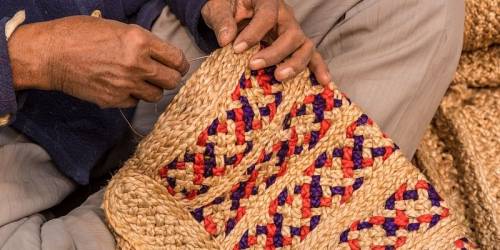
These biodegradable and reusable "golden fibers" are being used more and more every day. As the world moves to ban plastics, the jute bag making business is a good fit.
The jute bag making process is simple. Different types of bags are popular in the market and can be used for multiple purposes. Starting this business requires a small capital investment of around Rs 50,000- 1lakh. You can start with as little as 500 square feet.
Staple pins
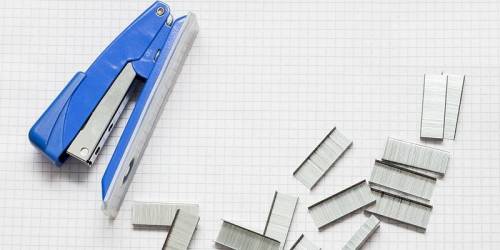
Staplers are widely used in schools, universities, government institutions, offices, and anywhere related to paperwork. Staplers cannot work without pins, and the nails are usually made of white galvanized iron wire. Using a quality iron will ensure that the nails are strong and durable.
Automatic pin making machines simplify the production process. The machine flattens round iron wire and produces nails in pre-set lengths. Pin-making machines that can produce 350 staples per minute cost more than Rs 3.5 lakh.
Paper Making

Paper is a low-cost business idea. Paper is used everywhere. From schools and universities to offices and large corporations, using paper is safe. This translates into endless demand for this product, even though the world is now digital.
From A2, A3 and A4 papers to small copies, there is a wide scope for expansion in the paper industry as well. However, you must be cautious when choosing a manufacturing site to avoid high transportation costs.
You need almost Rs 2 lakh-Rs 2.5 lakh to set up the machines and get the raw materials to start the business.
Organic soap
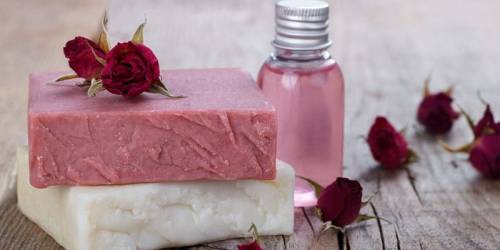
Organic soap is really a niche market that you should take advantage of if you want to start a small business. It is a high-demand product that is used by billions every day.
To start a small herbal soap business, you need raw materials like glycerin, herbs, essential oils, molds, microwave, and more. An investment of around Rs 1.5 lakh to Rs 2 lakh is required to expand production. You can start working from home or rent a small separate space. There are several government courses available if you want to learn the soap making process.
Coconut oil for hair
These days people have come to realize the use of natural products. Many do not hesitate to pay more for quality products when it comes to health and beauty. Therefore, starting a coconut hair oil unit can be a good idea for a small business.
This low cost business idea requires an investment of approximately Rs 1 lakh. You can start by renting small farmland or working with farmers in your area.
Tempered glass for smartphones

The smartphone market in India is growing despite the global market contraction. The Indian market recorded a shipment of 32 million units in the first quarter of 2019, according to the International Data Corporation (IDC).
Also, smartphone accessories such as tempered glass are in high demand. They are made on high-temperature machines where the glass is heated and then rapidly cooled. Tempered glass must also pass hardness tests, shatter tests, and dimensional checks. Tempered glass also contains silicone, additional protection, and glue. An essential component of manufacturing is glue, which ensures that the tempered glass adheres to the screen of the smartphone.
Low capacity tempered glass making machines cost around Rs 75,000, while high capacity machines cost more than Rs 1.5 lakh.
Envelopes and files

Although communications have become digital, envelopes and paper files are still in high demand in schools, colleges, businesses, etc. Various types of paper can be used, such as Maplitho paper or waste paper, depending on the requirements of buyers. Gum and glue must also be purchased from the market.
The envelope making machines cost anywhere between Rs 1.5-11lakh.
When paper is inserted into these machines, it is cut to specific sizes. After applying the gum, the envelope is dried and sent to packaging. These products can be sold in supermarkets and supermarkets or directly to schools, universities and corporate offices.
Paper bags

Eco-friendly bags and paper packaging are becoming popular as people realize how harmful non-degradable plastic bags can be to the environment. Paper bags can be used to package shopping items, food, medicinal materials, jewelry, etc.
Manufacturing of paper bags can be started on a small scale with little investment. Automatic paper bag making machines start at around 5 lakh rupees and have a large capacity, around a few thousand units per hour. Semi-automatic machines are also available under Rs 3 lakh, but they involve more work and labor.
Entrepreneurs also need to invest in raw material sources such as paper, ink, printing chemicals, labels, etc.
Also Read: How to Start Earning from Real Estate Investing with Just $500
POPULAR POSTS
Pine Labs IPO 2025: Listing Date, Grey Market Premium, and Expert Outlook
by Shan, 2025-11-05 09:57:07
India’s Largest Unicorn Startups in 2025: Rankings, Valuations, and Trends
by Shan, 2025-09-18 10:32:48
Swiggy Launches Toing App in Pune to Serve Affordable Food Delivery — What It Means for the Market
by Shan, 2025-09-16 12:29:08
Trending Startup Ideas for 2025: Where Innovation Meets Opportunity
by Shan, 2025-09-05 11:56:43
19 Best Business Ideas to Start in India 2025: From Low Investment to High Demand
by Shan, 2025-09-03 10:58:15
Razorpay Business Model Explained: How the Fintech Giant Makes Money in India
by Shan, 2025-08-05 12:10:28
How CRED Reimagined Credit Card Rewards into a Billion-Dollar Fintech Empire
by Shan, 2025-08-04 12:28:03
RECENTLY PUBLISHED

Loan EMIs to Drop as RBI Slashes Repo Rate - Full MPC December 2025 Highlights
- by Shan, 2025-12-05 11:49:44

The Agentic Revolution: Why Salesforce Is Betting Its Future on AI Agents
- by Shan, 2025-11-05 10:29:23

Top 10 Insurance Companies in India 2026: Life, Health, and General Insurance Leaders Explained
- by Shan, 2025-10-30 10:06:42

OpenAI Offers ChatGPT Go Free in India: What’s Behind This Big AI Giveaway?
- by Shan, 2025-10-28 12:19:11

Best Silver Investment Platforms for 2025: From CFDs to Digital Vaults Explained
- by Shan, 2025-10-23 12:22:46


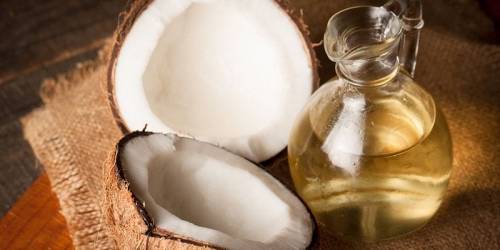



 Subscribe now
Subscribe now 